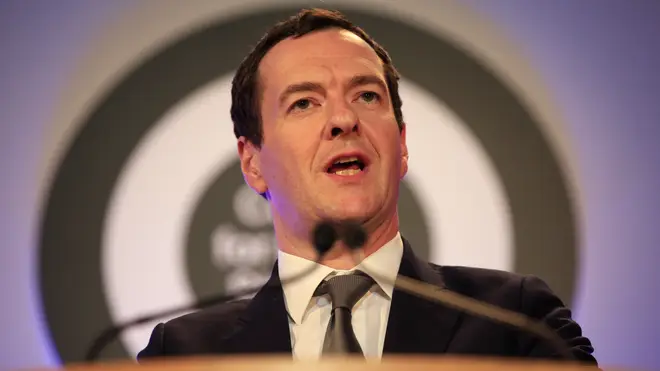
Tom Swarbrick 4pm - 6pm
9 March 2021, 15:44

The former chancellor says the decision in the Budget to put up taxes on business will have ‘consequences’.
Tory former chancellor George Osborne has warned that Rishi Sunak’s decision to raise corporation tax in last week’s Budget will have “consequences”.
Mr Osborne, who used his time in the Treasury to drive down corporation tax rates, said the move risked sending a message that the UK was not “pro-business” just as it needed to attract new investment.
Mr Sunak, the present Chancellor of the Exchequer, announced that he was raising corporation tax from 19% to 23% from 2023 as he sought to rebuild the public finances following the coronavirus pandemic.

However, speaking at an Institute for Government online event, Mr Osborne warned that it could prove counterproductive and questioned whether it would actually go ahead.
“I don’t want to criticise Rishi Sunak – he is doing a pretty good job in difficult circumstances,” he said.
“But I would say the idea you can increase Britain’s business tax by 25% and there will be no consequence – I don’t think even he would claim that either – is a mistake.
“Tax increases have consequences and we will wait to see – if this tax increase does indeed go ahead – what impact it will have.
“I think you have got to be careful as a country what signals you are sending around the world to a world that certainly doesn’t have much time to look into the UK tax code.”
He said that was particularly the case if the “basic message” to come from the Budget was that the UK was moving to a “very high rate of corporation tax”.
“You’re just sending a message around the world that Britain is not a particularly enterprising or pro-business place at the very moment when you want to be encouraging that in a recovery,” he said.
Mr Osborne – who is now editor-in-chief of London’s Evening Standard newspaper – said that when he was faced with the need to raise revenues following the global financial crash he had chosen to put up VAT instead.
He added that he believed that Mr Sunak would have preferred to take the same option if his hands had not been tied by the Tory election manifesto commitment not to put up income tax, national insurance or VAT.
“Ultimately, when I was faced with a similar choice on how to raise money I preferred the VAT lever to the corporate tax lever. I wanted to send a signal that Britain is a pro-business place,” he said.
“I suspect the Chancellor, if he had not been constrained by the Tory manifesto, he would have preferred to have raised VAT.”
Another Tory former chancellor, Lord Lamont, warned that further revenue-raising measures may be needed if Mr Sunak is going to deal with the deficit.
“When you look at the arithmetic in the Budget book, the way in which the current deficit falls so sharply in year 2 and year 3 I think is something where one wonders quite how it is going to be done,” he said.
“It looks as though there would have to be a very tight squeeze on public expenditure.
“I personally will be surprised if these tax increases are the last tax increases we see in order to deal with the problem of the current deficit in the short term that needs to be dealt with.”